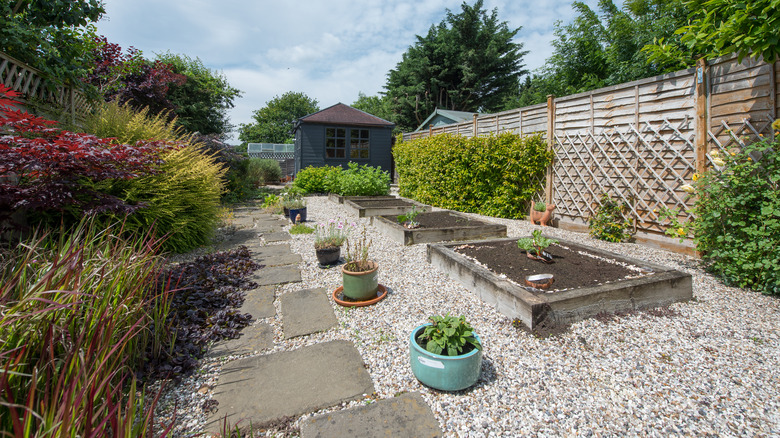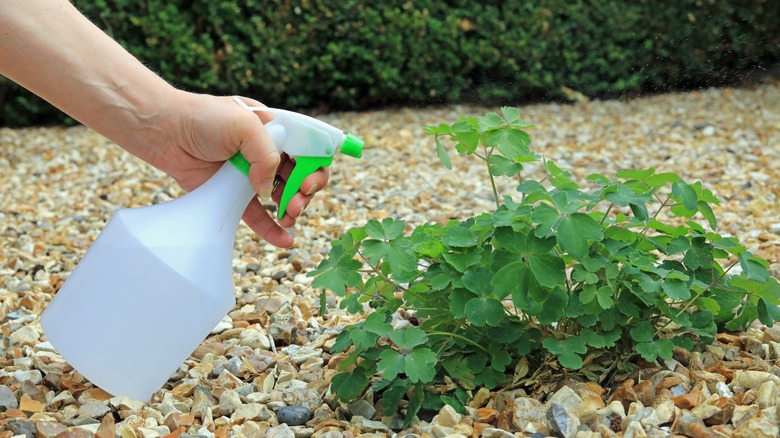One Simple Trick To Kill The Weeds Growing On Your Gravel Yard
Weeds can quickly mar the sleek look of even the most professionally laid gravel patio or garden path. Seeds, dropped by birds or blown in by the wind, nestle into the gaps between the stones. When the conditions are right, they sprout, adding unwanted patches of green. Sure, you could pull them out by hand, but that's laborious. You could also spray them with a commercial herbicide, but the thought of using harsh chemicals in the backyard doesn't appeal to everyone. Social media abounds with recipes for so-called natural sprays for weed-plagued gravel areas; over the years, one in particular has been heralded by garden bloggers and TikTokers, nursery owners, and even some extension offices alike as the best way to remove weeds from your gravel driveway. It involves mixing household vinegar, salt, and dish soap in a spray bottle and saturating weeds. Reportedly, the pesky plants start to die a few hours after spraying.
Acetic acid (the active ingredient in vinegar) is indeed used as a weed killer at a commercial scale, but here, you're talking about using a 10 to 20 percent concentration of the chemical. Using just vinegar at these higher concentrations as a herbicide will kill most weeds, but it also requires registration in some U.S. states. It's far stronger than the 5 percent acetic acid concentration typically found in the household vinegar you can buy from the supermarket, and needs to be handled with care for personal safety. Some experts stand firmly by the claim that only 10 percent or above concentration of acetic acid works as a weed killer. However, combining household vinegar with salt and dish soap boosts its efficacy, as a 2021 greenhouse study published in the Naresuan University Journal: Science and Technology confirmed.
Salt and soap science, and why this DIY weed killer might be detrimental
What exactly do the salt and soap add to this deadly, at least as far as weeds are concerned, concoction? Salt is a powerful desiccant; it dries out anything that comes into contact with it. That's bad news for juicy plant cells. Use it too often in your garden, and it will sanitize the soil, making it difficult for anything else to grow in that spot. While this effect would be undesirable in much of your backyard, your gravel patio is one place you want to keep clear. "Recipes that use [kitchen vinegar] but leave out the salt are nowhere near as effective," says Darren Strenge, Moss Garden Specialist at the Bloedel Reserve, via LawnStarter. As a surfactant, dish soap disrupts the natural surface tension and protective outer coating on a weed's leaves and stems, helping your homemade herbicide better penetrate the plant's tissues. It's also sticky, and keeps the solution on the plant longer.
There are also some more practical reasons why you should think twice before using vinegar to kill weeds — or mixing it with salt and soap for the same purpose. This mixture is indiscriminate; it can't distinguish between what is a weed or a very much wanted plant and will kill both equally. Likewise, while a household vinegar-salt-soap solution might be relatively safe for most mammals, birds, insects, and microbes may not fare so well. Also, outside of possibly the salt, this weed killer doesn't stick around for long, meaning it won't provide long-term protection or reach deep-seated root systems unless you spray an area often. And that's not very economical — unless your gravel-covered spot is teeny.
Mix a homemade herbicide using household vinegar, salt, and dish soap
So, should you craft a batch of this homemade weed killer? Honestly, when you weigh up the beneficial science against the downsides, the jury is pretty well out on this one. If you're indeed spraying this solution on a gravel yard with a few young, tender weeds (no older than two weeks from sprouting) and no other plants nearby, it's likely safe and effective. If the area is bordered by plants you hope to keep alive or the area has lots of perennial, well-established, or deep-rooted weeds, you might want to use a systemic herbicideor try regular hand-pulling instead.
If you've decided you're on Team Vinegar-Salt-Dish Soap or at least want to give it a shot this one time, it's time to gather your ingredients and equipment. Grab a plastic spray bottle of any size, a set of measuring spoons, a big jug, and a stirring stick. Walmart sells a 128-fluid-ounce bottle of distilled white vinegar (5 percent acidity) for under $4. Grab a canister of U.S. iodized salt for $1.25 at Dollar Tree. To be safe, use a planet-friendly liquid dish soap like Seventh Generation Free & Clear — Walgreens has a 19-ounce bottle for about $4.
Most sources say to mix 1 gallon of vinegar with 1 cup of salt and 1 tablespoon of dish soap, though the Pueblo County Extension office suggests using the vinegar, salt, and detergent in equal measure. Crucial DIY weed killer tips to know before you spray include carefully spritzing the solution only on the weeds you want to kill until they're soaking wet during the hottest, sunniest part of the day. Make sure you focus on the leaves and not the soil.

